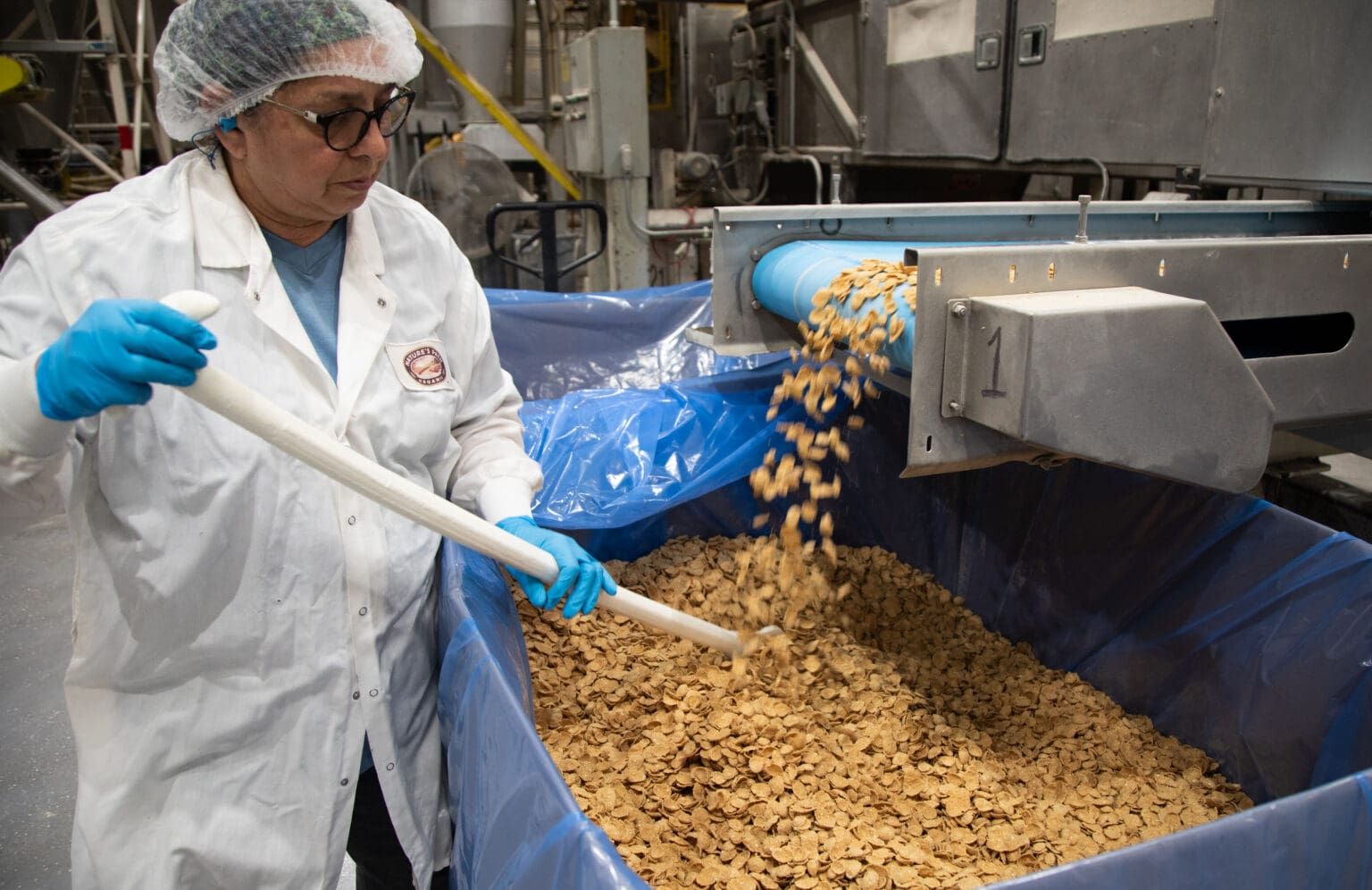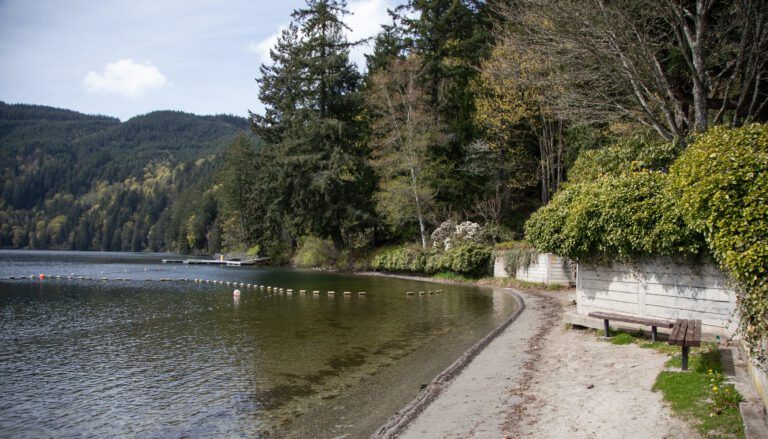No banana bread. A prominent Cascadia organic foods company has a change at the top, but apparent continued steadiness in how it serves its mission, vision and — of course — breakfast. Not to mention its strong cross-border ties.
Nature’s Path Organic Foods announced in July that Arjan Stephens had been named president, passing leadership of the family-owned company from its founders to the next generation. Stephens is no stranger to what is described as North America’s largest certified organic breakfast and snack food company: He had been general manager and president of Que Pasa, one of the company’s several brands.
And while based in Richmond, British Columbia, just south of Vancouver, Nature’s Path itself is no stranger to Northwest Washington. Its Blaine manufacturing facility, which was the company’s first in the U.S., is marking 25 years in operation and turns out roughly 45–50 million pounds annually of granola, cereal and oatmeal for the Nature’s Path and Love Crunch brands.
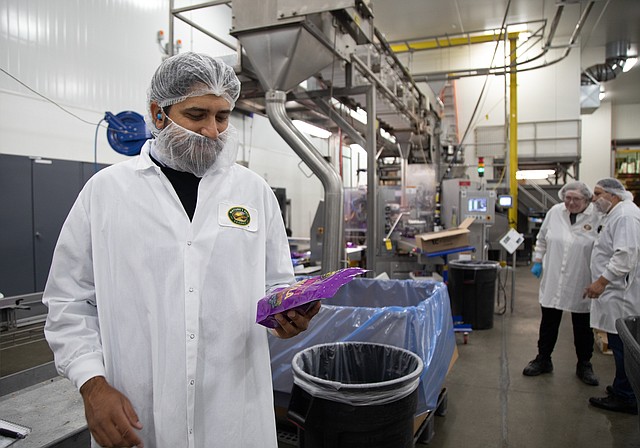 Nature’s Path Organic Foods President Arjan Stephens holds a bag of freshly packaged Nice and Nobbly Granola. The granola is a product sold in the U.K. (Hailey Hoffman/Cascadia Daily News)
Nature’s Path Organic Foods President Arjan Stephens holds a bag of freshly packaged Nice and Nobbly Granola. The granola is a product sold in the U.K. (Hailey Hoffman/Cascadia Daily News)
Stephens acknowledges that not everyone around Blaine may know that, even if they buy its bags and boxes at Costco, Trader Joe’s or one of many other retailers in 50 countries that carry the company’s products. That includes the nine (from the U.S. and U.K. to Japan and New Zealand) supplied by Blaine’s operations.
“I think people don’t actually realize that it’s made in this area, but they recognize the brand,” Stephens said. “We’re known for the quality of our products. And our taste.”
The company’s presence in Blaine is significant. Stephens said 215 people, or about a third of its total worldwide workforce of 682, are employed in Blaine. Nature’s Path said it invests back into the community by donating product and cash to local food banks and charities, encouraging employee volunteer projects and promoting zero waste initiatives — the last an emphasis in line with the company’s sustainability mission.
“For example, we send the wastewater from Blaine manufacturing to a biodigester facility in which it is turned into renewable energy for Blaine and surrounding, local farms,” Stephens said.
Nature’s Path got its start in Vancouver in 1985 when it was founded by Arjan’s parents, Ratana and Arran Stephens. Ratana, most recently CEO, has now retired and joined Arran on the company’s board of directors.
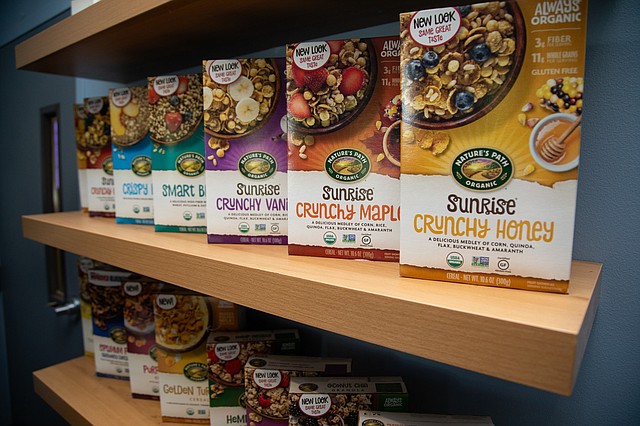 Packaged Nature’s Path cereals sit on shelves in the lobby of the company’s manufacturing facility in Blaine. Its brands include Love Crunch, EnviroKidz, Nature’s Path, Que Pasa and others. (Hailey Hoffman/Cascadia Daily News)
Packaged Nature’s Path cereals sit on shelves in the lobby of the company’s manufacturing facility in Blaine. Its brands include Love Crunch, EnviroKidz, Nature’s Path, Que Pasa and others. (Hailey Hoffman/Cascadia Daily News)
Meanwhile, the company has grown steadily over the decades, including through acquisition: Que Pasa Mexican Foods in 2013, Country Choice Organic in 2015, Anita’s Organic Mill in 2021 and Love Child Organics this June.
If you spot a common thread, that’s intentional.
“Every business decision Nature’s Path Organic Foods makes is rooted in our commitment to provide universal access to organic, nutrient-rich food for consumers and their families,” Stephens said. He said the Love Child Organics acquisition was strategic to position Nature’s Path in the “flourishing” baby food market.
Nature’s Path doesn’t disclose its revenues — it’s privately held — but will say that its sales have grown an average of 5.25% per year over the last four years, outpacing the average 4.7% annual growth of U.S. organic food sales as measured by the Organic Trade Association.
Stephens said when it came to outside funding, at founding, his parents “had a small number of family and friend investors who the company has since bought out. As the company grew, they relied on debt financing (the bank) when needed rather than taking on external partners.”
And yes, he said, larger competitors (cereal giants Kellogg and General Mills among them), have tried to buy Nature’s Path. “And we’ve said no, we want to stay independent and family-owned,” Stephens said.
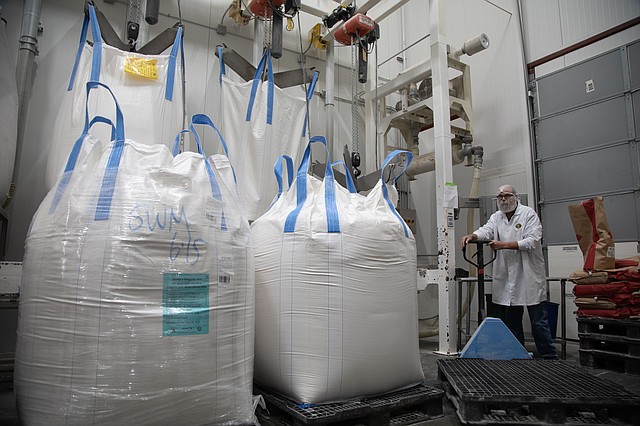 Michael Molitar moves an empty pallet while working with giant bags of wheat flour. The Blaine manufacturing facility for Nature’s Path was running production lines on July 13 for Mesa Sunrise and Heritage Flakes cereals. (Hailey Hoffman/Cascadia Daily News)
Michael Molitar moves an empty pallet while working with giant bags of wheat flour. The Blaine manufacturing facility for Nature’s Path was running production lines on July 13 for Mesa Sunrise and Heritage Flakes cereals. (Hailey Hoffman/Cascadia Daily News)
A tour of the Blaine manufacturing facility, which Stephens later described as the first zero-waste facility making cereal, illustrated the family’s approach.
Behind an incongruously rustic entryway displaying the company’s pastoral logo, the tall 132,000-square-foot metal building is full of dull gray and gleaming silver metal machinery that wouldn’t look out of place in a spotless industrial steampunk movie.
On the day of the interview, Blaine was running two lines simultaneously, one for its Mesa Sunrise cereal and the other for its signature Heritage Flakes.
At every stop — from human-height dry ingredient mixing sacks to extruders that cook the liquid dough under high pressure, to a conveyer that takes newly (and loudly) flattened flakes and sprays hot air on them — Stephens pointed out steps taken to reduce waste and support other company sustainability initiatives.
None of it came across as forced talking points. All came up incidentally in conversation, even a brief discussion on the taste merits of oat- versus almond-based milk substitutes on cereals. Sustainability and organics are subjects Stephens seems to, well, naturally gravitate toward.
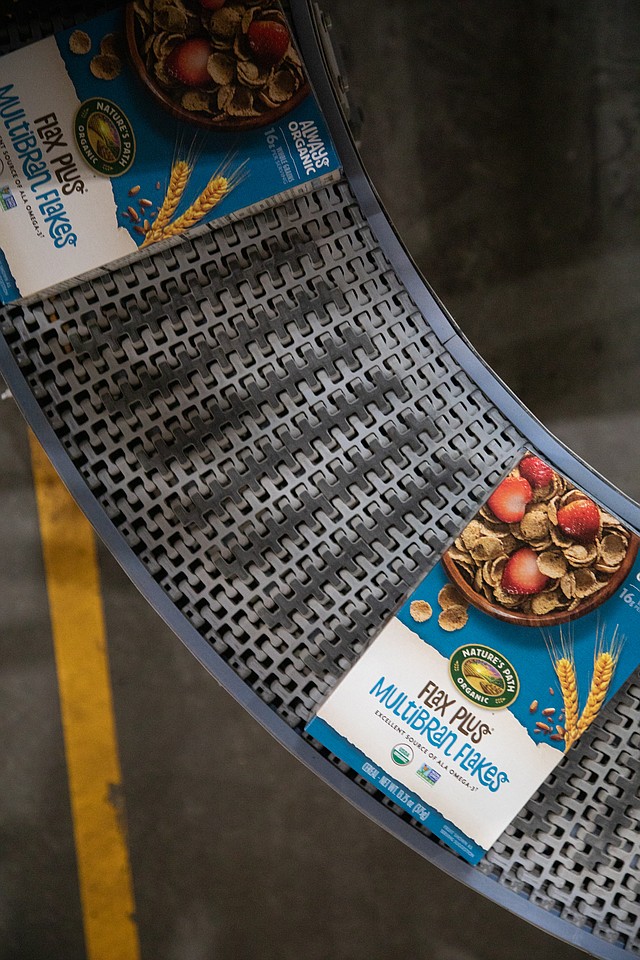 Boxes of Flax Plus Multibran Flakes roll along the conveyor, headed for boxing and shipment. A robot helps pack the boxes at the Nature’s Path facility in Blaine. (Hailey Hoffman/Cascadia Daily News)
Boxes of Flax Plus Multibran Flakes roll along the conveyor, headed for boxing and shipment. A robot helps pack the boxes at the Nature’s Path facility in Blaine. (Hailey Hoffman/Cascadia Daily News)
Like many businesses that go from startup to prominence, Nature’s Path has had its failures. In some cases, it’s timing — Stephens said they launched the first products with chia seeds “at the time when everyone knew chia as ‘ch-ch-chia pets’” — but later relaunched a number of them when chia’s health benefits became more widely known.
Another disappointment, he said, was Love Crunch Banana Bread, a product they thought was “fantastic tasting” but didn’t sell. And an attempt at pasta as well as other entries into what Stephens called “non-core businesses” didn’t work out.
“I think we, over time, realized that our sweet spots surround breakfast and snacking,” Stephens said. “And that’s where we’ve had the most success.”
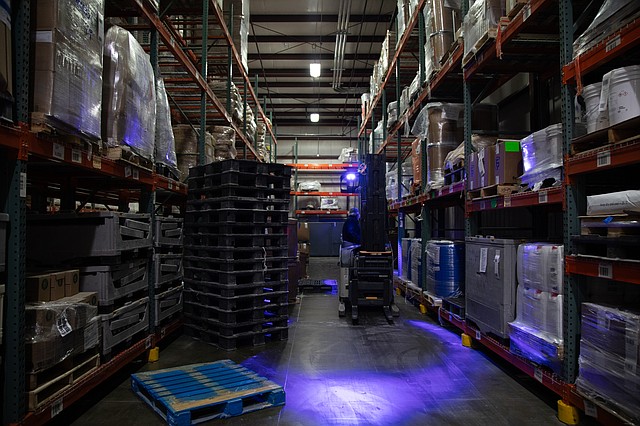 A forklift travels through the warehouse portion of Nature’s Path Organic Foods in Blaine. The 132,000-square-foot manufacturing facility stands about 30 feet tall. (Hailey Hoffman/Cascadia Daily News)
A forklift travels through the warehouse portion of Nature’s Path Organic Foods in Blaine. The 132,000-square-foot manufacturing facility stands about 30 feet tall. (Hailey Hoffman/Cascadia Daily News)
Nature’s Path does plan more products. Stephens wouldn’t do more than hint that they’ll include “novel ingredients,” new flavors of granola, new oatmeals and innovation in the Que Pasa chips business.
His advice for small businesses in the Cascadia region that would like to grow the way Nature’s Path has?
“Always stick to quality. I know it sounds trite, but it’s true,” Stephens said. “If you have a high-quality product and you really serve your customers well, you will be rewarded.”
And, he said, don’t give up.
“We’ve launched many product failures over the years,” Stephens said. “But we are fortunate to find things that were successful as well, and then really doubled down on them and focused on those few things that were really successful for us — and that allowed us to get momentum and grow.”
Places & Things
Gallery Syre has a new name — Cordata Gallery. In an announcement, the gallery at 465 W. Stuart Road in Bellingham said that “the gallery is growing and we want to be more connected with the neighborhood.” Cordata Gallery’s inaugural exhibition, “Fresh Perspectives,” opens on Saturday, Aug. 5.
(For the latest Places & Things, check here throughout the week.)
Frank Catalano’s column is published online and in print Fridays. Email: frankcatalano@cascadiadaily.com; Twitter @FrankCatalano.
A previous version of this story contained outdated information about the Blaine facility’s zero-waste status that has been updated by the company since the tour to state that it was the first, but is no longer the only, zero-waste facility making cereal. The story was updated at 3:15 p.m. Friday, Aug. 4 to correct this information. Cascadia Daily News regrets the error.

